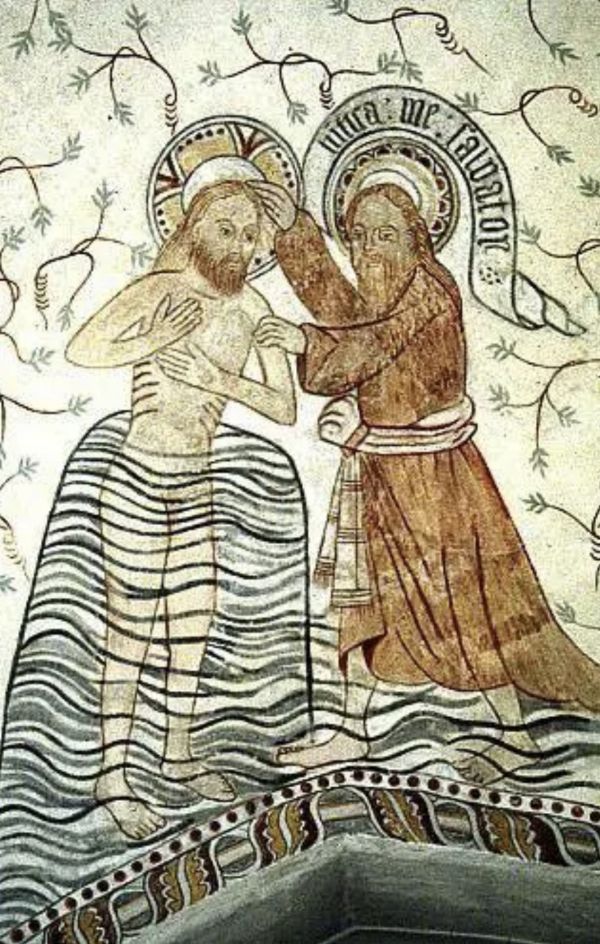The muddy condition of the Jordan and the human dimension of Jesus
(Mt 3:13-17; Mk 1:7-11; Lk 3:21-22; Jn 1:30-34)
The Jordan River was never navigable; it simply marked a border. In the mentality of time, between the land of others and the sacred realm of freedom; and here is the concrete distinction of the Incarnation.
Let us outline some considerations that recover the meaning of this historical fact - which for us can be like a ‘sun’ inside - with which the liturgy completes the path of Christmas time.
Jesus was in search, eager to sift, to learn.
It may seem incredible to us, but he recognized himself ignorant, in need of evolving - not of becoming “better” and stronger, but of ‘looking inside’ things - and move the gaze elsewhere.
In that strongly engaged but overly serious environment he understood definitively who the Subject of the spiritual journey is: the divine Life, which draws us into the experience of happiness, of authentic and solid love.
The Kingdom cannot be prepared and even set up [it would become a projection, a conditioned reflection, an outer tower, like Babel] - rather, it must be Welcomed. Because it Comes.
The results that appeal to our genius and muscles, at first they are unnerving, then they become frustrating; lastly they block the growth of the innate universe, because they turn off the novelties, obfuscate the Source of being and enthusiasm.
The religious man who does not make the leap of the Faith, stagnates in the depressing finding of the difference between expected results and concrete facts.
Paradoxically, he focuses the streets on himself, but doesn’t lays his eye ‘on’ his essence. He obeys - perhaps - but doesn’t listen.
Having lost the even relational sense of his unrepeatable Unicum - he measures all his inability to perceive, elaborate, realize, those designs that guide his dreams and resources to fullness.
He loses all his energy by making induced, contrived, off-scale resolutions, wich make him supposing and acidic - simply because those artifact targets dry him down: they do not concern him.
Meanwhile, the "perfect" and stressful discipline that imposes to himself, as if he were the Protagonist, takes away from him the joy of meeting his superior talents and fully experiencing what reality provides.
Perhaps he does not extract from his own ‘mine’ (entirely at hand) those abilities that realize the personal Mission.
He does not even notice it - all caught by absolutely derived or conforming ideas and disciplines, able only to dismantle his peaks and rarity.
Always with a look on the past, or on the common [even glamorous] thinking of the authorities, of others, of the surrounding environment - and what is believed "should be", according to established and damping ethicalisms.
Finally, the discrepancy between what to wich one has given so much [without perhaps ever understanding what God is really calling to] and what has been achieved, destroys the exceptionality.
It weakens Hope itself, triggering an inexorable sadness, or the useless individual and ecclesial routine.
Adult Jesus who lets himself be immersed in the waters of the Jordan is icon of a proposal that sublimates the conspicuously murky swamps of our condition.
Not only by seeing the possibilities, but even making them ‘cheerful’: so in all the oriental icons, which accentuate their elegant volutes.
How can our Lord stand beside an indistinct crowd of sinners and skids, seeking redemption?
Jesus noticed: in each one of them surfaced a talent. And we are at the lowest point on earth - 400 meters below sea level.
This is precisely the leap in quality that discriminates against a simple-minded religiosity [even cloaked in great things] and the growth of Faith.
The Son reveals divine life, which is manifested ceaselessly ‘friend’. Face of God that does not destroy but approaches, to bring out the stifled possibilities.
He doesn’t crush, humiliating our inclinations, and adding unbearable burdens. He’s not the King of submissive and fatigued persons.
He enters a reality also made of mud, but that prepares our developments, and desires to grow - producing paths often interrupted, but finally the unexpected Flower.
In this way we learn to love our limits and the many slimy conditions: they remind us of the Jordan.
Earth needs Light, but Light needs ‘earth’. They are expression of the New Covenant.
[Baptism of the Lord; homily. For a perhaps more fussy and characteristic biblical relief, cf. the extended comment, at the bottom of the site: www.duevie.art]












